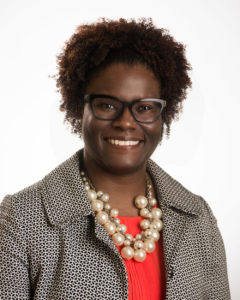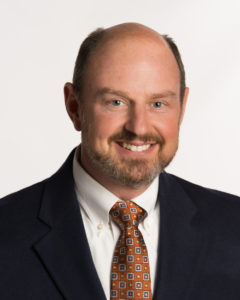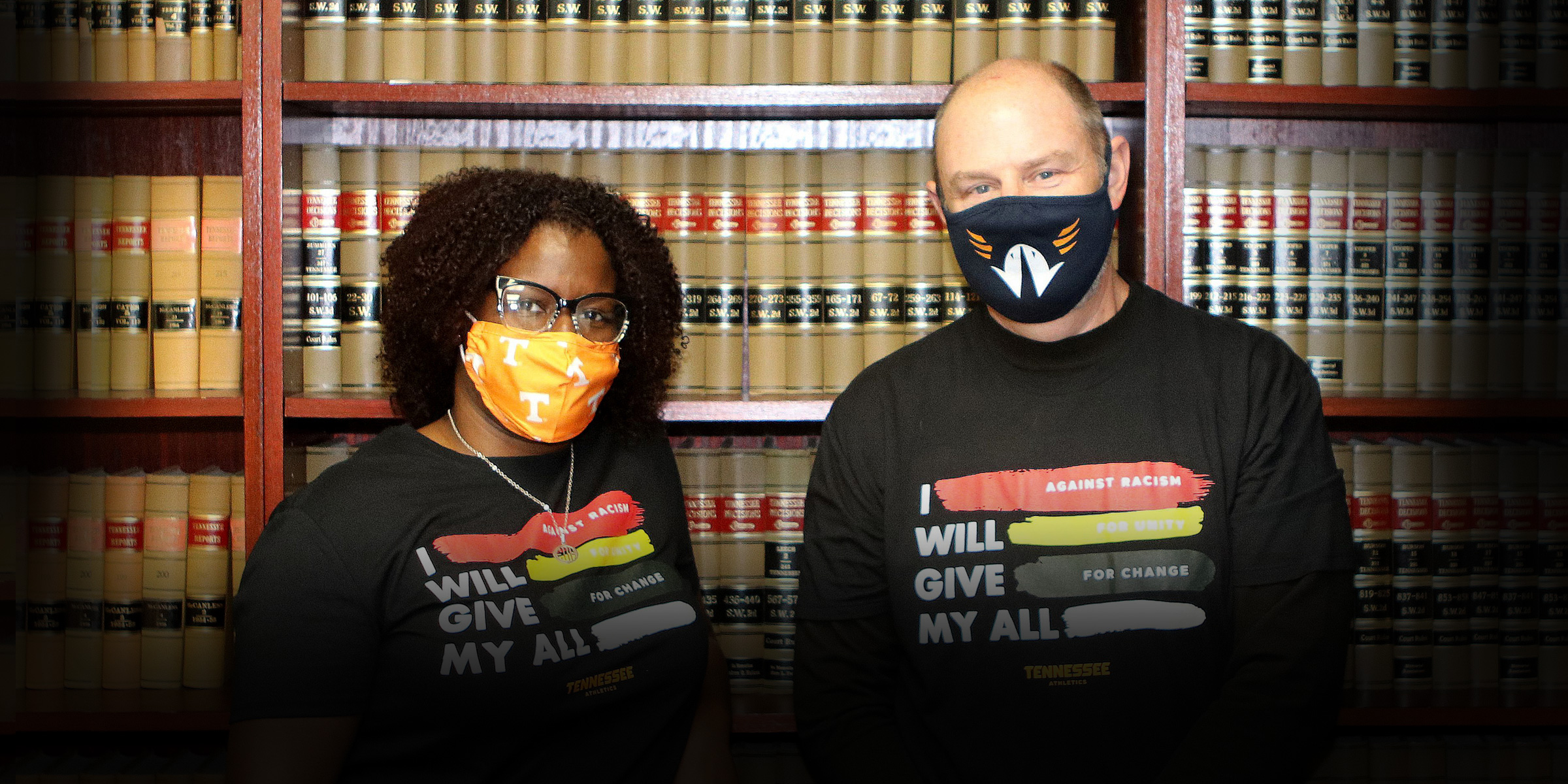By Susan Robertson | Photo by Stephen Austin
Institute for Public Service (IPS) employees Kenny Smith and Elisha Hodge normally wouldn’t have many opportunities to interact.
Smith is a solutions consultant with the Center for Industrial Services in Johnson City, and Hodge is a legal consultant with the Municipal Technical Advisory Service in Nashville. However, the two have forged a friendship built on an appreciation of each other’s differences, shared values and the desire to be a part of positive change.
“I think what makes our friendship so authentic is that we are not afraid to have the critical and long-overdue conversations around privilege, power and inequity,” says Hodge, who is Black. “When you have a friend like Kenny who you know does not have a disingenuous bone in his body, you don’t get offended when certain questions are asked. I’ve really appreciated him asking questions.”
Smith, who is white, and Hodge knew of each other through work but got to know each other better when Hodge helped Smith’s daughter with a speech by connecting her to Cristine Darden, one of the NASA mathematicians featured in Hidden Figures who was the keynote speaker for the 2019 IPS Annual Conference.
Several months later, Smith attended Opening Doors, a workshop hosted by IPS that provided training and education related to all dimensions of diversity, inclusion and equity. After attending the training, he asked to join the IPS Diversity Committee, which Hodge chaired at the time.
“I wanted to learn what I don’t know,” Smith says.

What he realized after the training and through his friendship with Hodge is that, when given the opportunity, he has always tried to help open doors to employment for everyone, not just those who look like him. He was being an ally, even before he knew what that word meant.
In a graduate class of five at East Tennessee State University, Smith befriended two African classmates and worked to help them find employment after graduation. Smith helped one, from Togo, get interviews with four manufacturers, but he only had one offer. The other felt defeated and left Johnson City, hoping for more opportunities elsewhere.
“It’s frustrating being in factories and seeing how employers can’t find employees and at the same time seeing the struggles of these great, qualified candidates,” Smith says. “I realize it’s difficult to hire international students, but I asked, ‘How do we get more doors to open for them?’”
The events of this past year also are a topic the pair frequently discusses.
“After the death of George Floyd, I saw all the unrest and divisiveness and wanted to know how to get involved and use what I recognize as my privilege to help people in my community. Elisha was the obvious person to go to with my questions. I can ask her anything and know we can have an open and honest discussion about it,” Smith says.

One of the first things they did was read and discuss works such as “My America,” a poem by Langston Hughes, and the July 5 speech from Frederick Douglass.
“I’m as patriotic as anyone, with a big American flag flying in my front yard. When I hear The Star-Spangled Banner, I visualize those bombs bursting over Fort McHenry, and I think about those who fought and still fight for our freedom. But reading those two works made me think differently about those who kneel for the national anthem. Honestly, I used to get offended, too, but Douglass’ speech made me realize that, on July 4, 1776, Blacks were not freed,” Smith says. “I hadn’t thought about it like that before—that July 4 wasn’t their independence day.”
Smith and Hodge have also listened to and discussed the audio version of Between the World and Me by Ta-Nehisi Coates and How to Be an Anti-Racist by Ibram X. Kendi. As part of an IPS Diversity Committee project, both Hodge and Smith watched the movie Just Mercy and participated in a group Zoom discussion.
“One of the things that I made clear to Kenny early on in this journey was that I am neither the voice of nor the authority on all things related to people who identify as Black, brown or minority. Each of us have different backgrounds and lived experiences. But, through exposure to the works of different authors from underrepresented and marginalized groups, we could explore voices from these groups together,”
Hodge says.
Smith has attended meetings of a diversity and inclusion group in the Tri-Cities and joined its book club, and at Hodge’s suggestion he has scheduled lunches with individuals who are members of that group and with minority leaders in the manufacturing sector in the area.
“Listening to Kenny talk, you quickly pick up on the fact that he has a sincere interest in social issues and injustice—but he doesn’t just talk about these issues; he turns words into intentional action. That is rare, and that is why I value our friendship,” Hodge says.
Smith says, “I value my friendship with Elisha so much, and I have to say she’s opening doors for me. She helped me see the importance of really getting to know people on a deeper level by encouraging me to ask about their experiences. This journey of learning is one I’m glad to be on, especially with Elisha to consult with along the way.”



